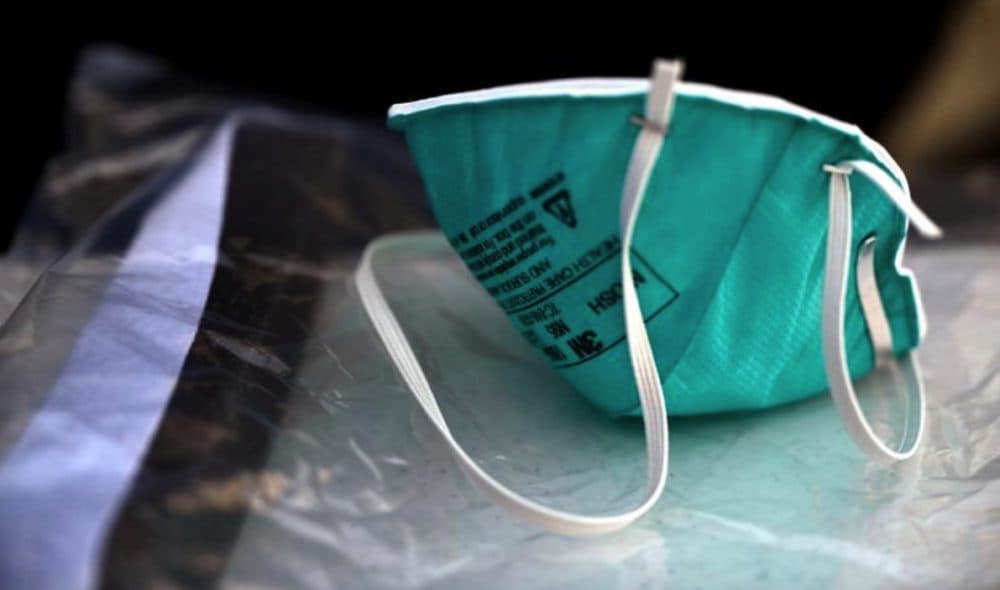Advertisement
Coronavirus Coverage
Masks will become optional for most hospital patients, visitors and staff

Massachusetts hospitals will lift the requirements that all patients, visitors and employees wear face masks to stop the spread of COVID.
The move represents a broad policy shift to managing COVID less as a crisis and more as a routine health issue, more than three years since the start of the pandemic.
The universal masking requirements have been in place since 2020. Now, state and federal officials are winding down a host of pandemic-era policies as they end the COVID public health emergency on May 11.
This includes a statewide masking order for health care facilities. Hospitals can still choose to require masks, but several hospital leaders told WBUR that they will make masks optional in most clinical areas, starting next Friday, the day after the end of the public health emergency.
The hospital systems changing their policies include Mass General Brigham, Beth Israel Lahey Health, Boston Medical Center, Tufts Medicine and UMass Memorial Health.
Dr. Sharon Wright, chief infection prevention officer at Beth Israel Lahey, said universal masking was “very effective” earlier in the pandemic. But now, COVID numbers have declined, and tests, vaccines and treatments are widely available.
“Given these changing circumstances, we are in a safer place to end universal masking at this time,” Wright said in a statement.
Hospitals will maintain mask requirements in some areas. At UMass Memorial, for example, employees will have to wear masks in emergency departments and cancer treatment clinics. But masks will become optional for patients and visitors, said Dr. Eric Dickson, chief executive of UMass Memorial.
“We’ve been through a lot together during the pandemic, and one of the requirements that I know saved lives was universal masking in health care settings,” Dickson said in an email to staff, which was shared with WBUR.
“However, now that we are coming out of the pandemic, it will be a welcomed moment to relax some of these requirements in certain areas, while respecting the personal preference of those who wish to continue to wear a mask," he wrote.
Advertisement
Dr. Shira Doron, chief infection control officer at Tufts, said in a memo to staff that the policy change is a significant milestone in a long journey for health care workers, and acknowledged it may come “with mixed emotions.”
COVID spreads through the air, and people can transmit the virus even if they don’t have symptoms.
Masking in health care facilities has been a key strategy for controlling the spread of COVID since early in the pandemic, when hospitals were swarmed with huge numbers of seriously ill COVID patients. At the time, doctors and hospital leaders pleaded with the public to wear masks — in health care facilities and elsewhere.
More recently, COVID cases and hospitalizations have fallen to among their lowest points since spring 2020.
But Dr. Lara Jirmanus, a primary care physician who co-founded the Massachusetts Coalition for Health Equity, said she’s appalled that hospitals are dropping mask requirements. She said the policy change will harm patients, particularly those who are immunocompromised and at greater risk of becoming ill from COVID.
“I know people who have already told me they will forgo essential medical care because they are concerned about the credible threat of contracting COVID in the doctor’s office,” she said. “Why are we trying to get rid of masks in health care when they also prevent respiratory infections like flu?”
State health officials told WBUR their decision to lift the statewide masking order next week follows “extensive conversations” with health care experts. “The Department of Public Health will continue to carefully track COVID-19 cases in Massachusetts and adjust as circumstances change,” a department spokesperson said.
Hospital leaders also said they will evaluate and revise mask policies as needed.
Dr. Ted Calianos, president of the Massachusetts Medical Society, said in a statement that if COVID transmission rises again, he would advise people to consider wearing masks again.
Katie Murphy, president of the Massachusetts Nurses Association, said many nurses are likely to continue wearing masks at work to protect themselves and their patients.
“COVID is still out there,” said Murphy, an ICU nurse.
“We’re still exposed to people who may be asymptomatic carriers of COVID. We’re still caring for people who are immunocompromised.”
More than 22,000 people in Massachusetts have died from COVID since the start of the pandemic.
People who are elderly or who have underlying medical conditions are at highest risk of serious illness. But the disease has become less severe for most people, thanks to treatments, vaccines and immunity from previous infections. Recent research indicates the coronavirus itself also may be becoming less dangerous.
